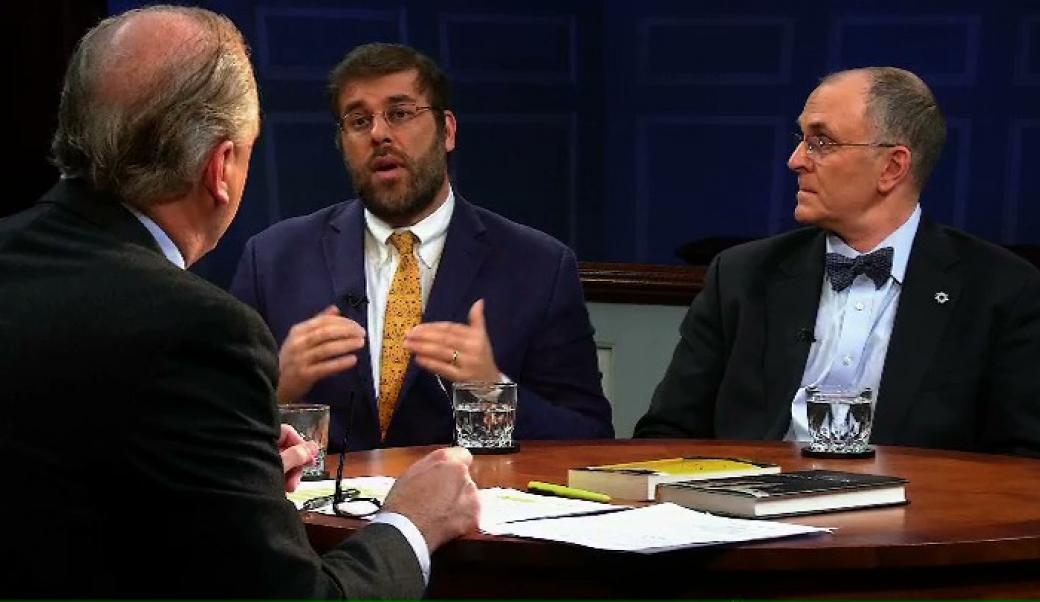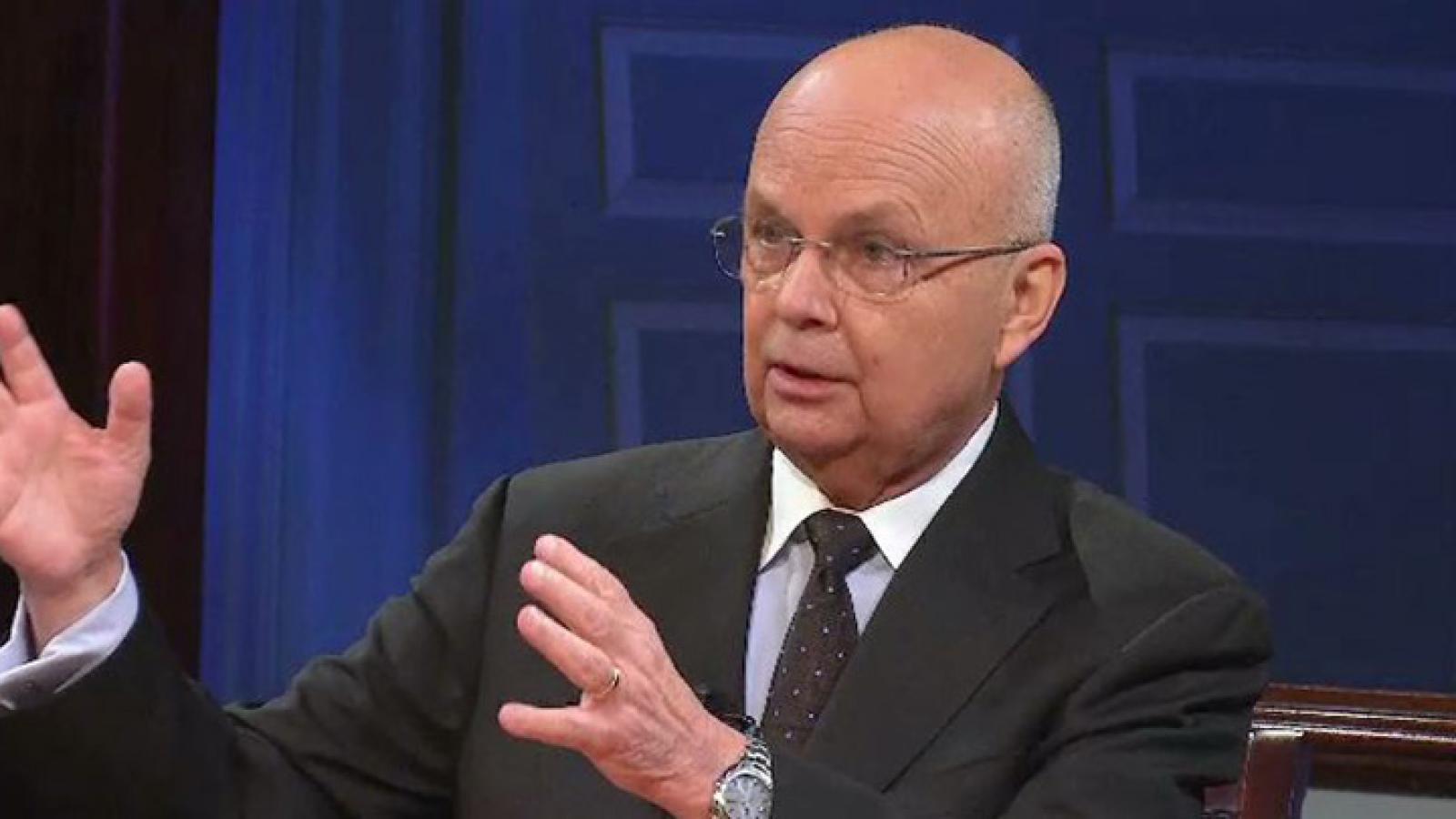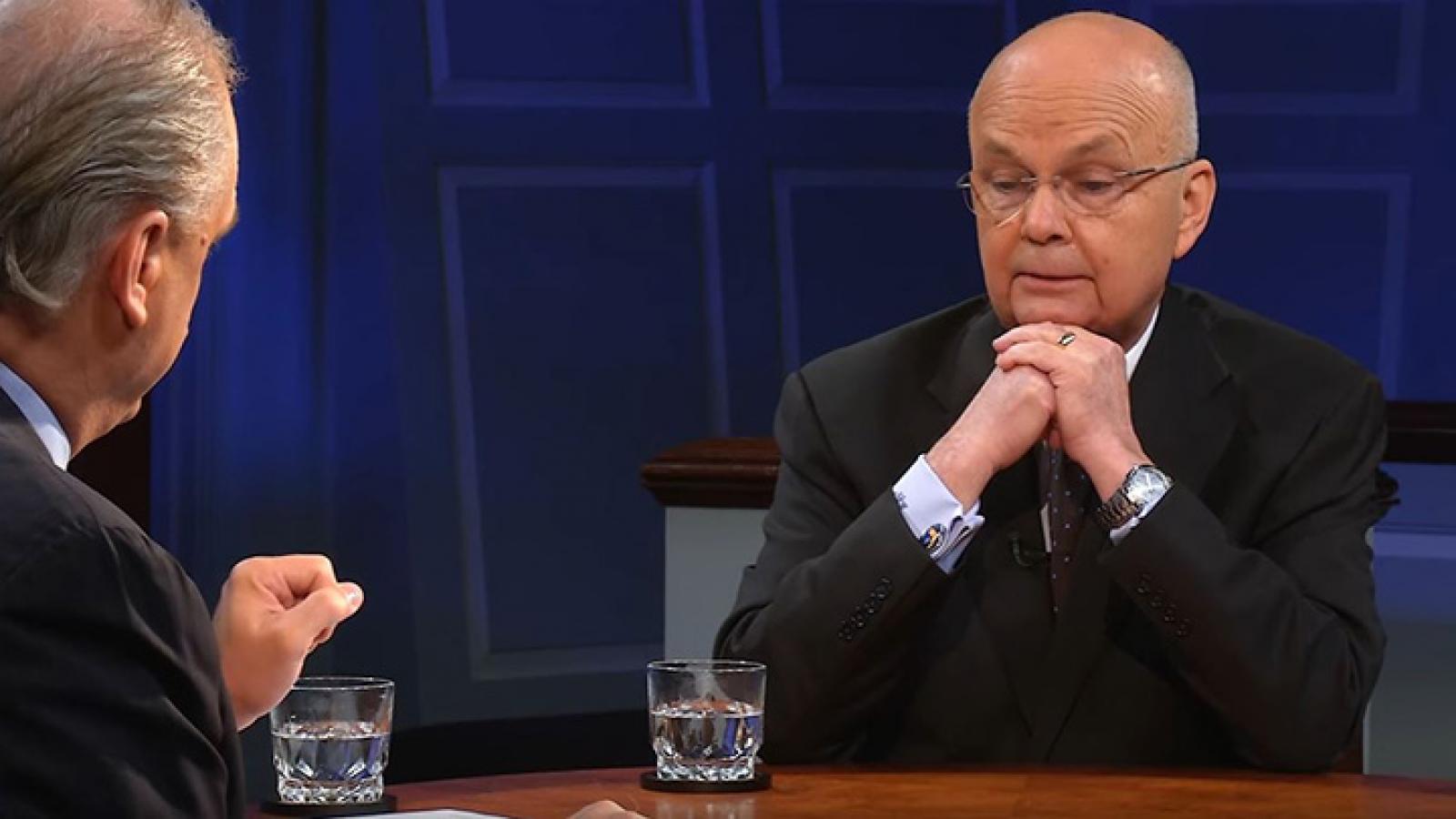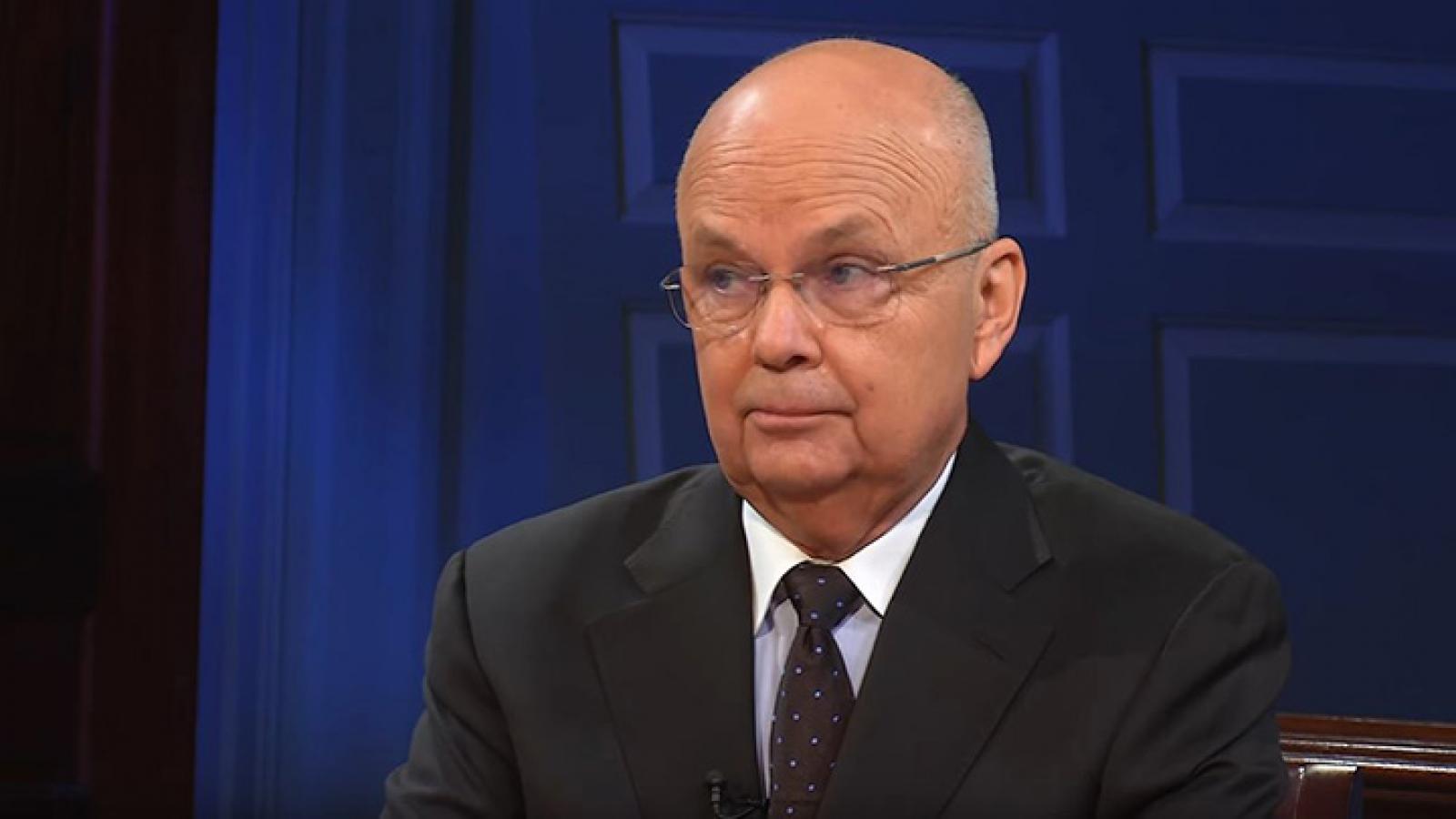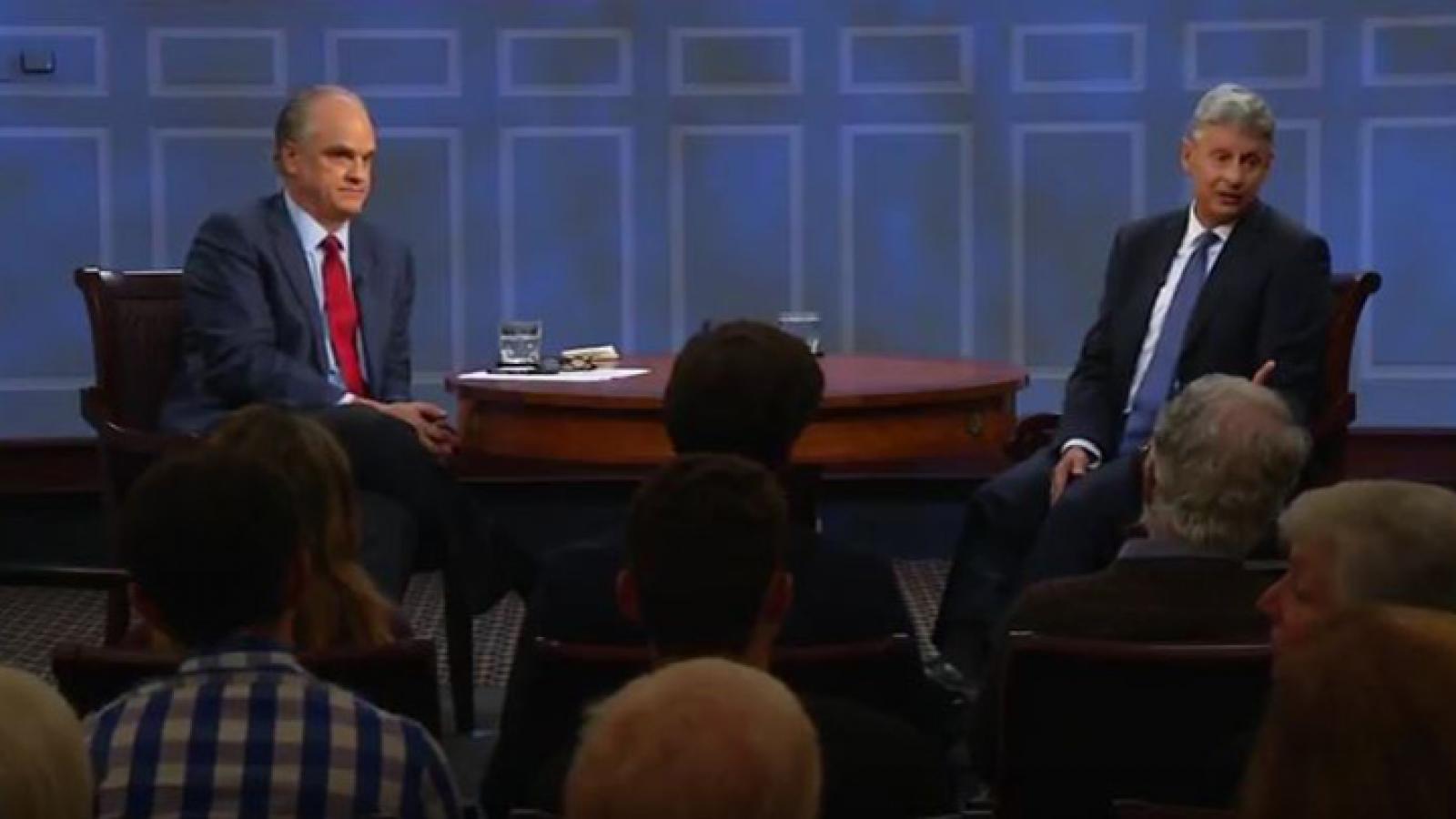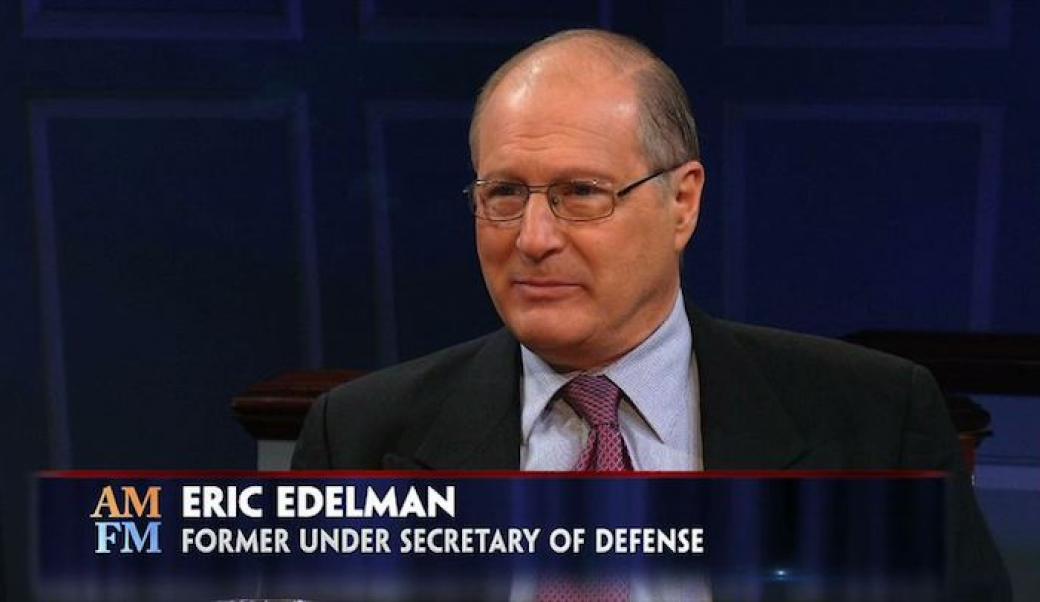About this episode
November 04, 2016
Michael Hayden
From 1999 to 2009, Air Force General Michael V. Hayden served at the very top of America’s most critical intelligence-gathering organizations: as director of the National Security Agency, as a top White House advisor to the George W. Bush administration, and finally as director of the Central Intelligence Agency. He’s written a book about that remarkable period and the challenges he faced, "Playing to the Edge: American Intelligence in the Age of Terror."
American Defense and Security
Playing to the edge
Transcript
Doug Blackmon: Welcome back to American Forum. I’m Doug Blackmon. In the 15 years since the terror attacks on September 11, 2001, Americans have been confronted with continuous, but constantly evolving, questions about the most effective ways to keep the nation safe, how to identify our enemies, what to do about them, what limits should we impose on our soldiers, our intelligence agencies and ourselves as citizens. How should we project our image and values across the globe while protecting vital interests, and all Americans?
FACTOID: The Question: How do we keep the nation safe, while protecting American values?
Our guest in this episode has wrestled with those questions throughout this new era. From 1999 to 2009, Air Force General Michael V. Hayden served at the very top of America’s most critical intelligence gathering organizations. As director of the National Security Agency, as a top White House advisor to the Bush administration, and finally as director of the Central Intelligence Agency. He’s written a book about that remarkable period and the challenges he faced. The title is Playing to the Edge: American Intelligence in the Age of Terror. Thank you for being here.
Michael Hayden: Thanks Doug.
1:56 Blackmon: I always hate asking authors about the titles of their books because it’s the most obvious question you could ever ask, but your title is Playing to the Edge which and there is this very interesting discussion about throughout your time in these critical roles that you were always trying to play to the edge of the limits, the boundaries. But so, from the time before 9/11 through most of that period, how did the edge move? Where was it before?
Hayden: Sure so first of all with regard to the title, that’s my wife’s, she’s the one who came up with that. She read the manuscript and random off said “hey you need a title here guy.” And mulled it over for a day or two and her having read the manuscript, thought that best summarized what it was I was trying to say. I take full credit for the colon that comes after it [laughter] and the fine print “American Intelligence in the Age of Terror”
Blackmon: And all other punctuation throughout the book, alright we got that.
Hayden: But the theme you point out is that within our profession, when the circumstances demand it, you just don’t do this haphazardly. You use the full authority, the law, and policy gives you. Now look, I call it the box we’re allowed to operate in. We don’t create the box. The box gets delivered to us by the American political process. But when we gotten the box and circumstances demand it, you use the entire playing field so to speak. Now look, Doug, when we do that I know it’s going to end up sooner or later in one coast or another’s newspaper LA, New York, Washington, with some pretty harsh words, probably a tough congressional session or two. So there’s an instinct that we really have to do this, but if you play back from the edge, you might be protecting you or more notably your agency, but we’re not protecting you and the American people. So quite unapologetically, I describe that given that new box, we play to the edge. Lemme just add one additional point, near the end of the book I talk about our getting a new president. I was President Obama’s CIA chief for three weeks while we’re waiting for Director Panetta to be confirmed. He changed the box. And the day he issued his executive order two days the inauguration, I sent a note to the entire CIA workforce saying that the President has given us precisely what we need. He has given us clear guidance. It is different guidance it’s a different box, but we will play as fully in this new box as we did in the previous one.
FACTOID: Leon Panetta served as secretary of defense and CIA director
4:30 Blackmon: And the in terms of how the edge moved from before 9/11 and most of the discussion we’ve heard about the pre 9/11 intelligence environment was essentially a criticism of the difficulties the different agencies had working together, that there was a protectiveness of the turf of these different…
Hayden: Beyond turf. We Americans as a methodology to preserve our security and liberty have been pretty comfortable given our geographic position to put foreign over here, domestic over here, intel here, law enforcement there, put a wall between the two. And on September 11th 19 hijackers drove right through that gap I just described to you. So now the challenge becomes how do you begin to blend foreign and domestic, intelligence and law enforcement, because the external circumstances now demanded that? And Doug, I thoroughly admit that was new art and science. We weren’t quite making it up, but we were responding to certain circumstances that we as a nation had never faced before.
Blackmon: So what was your immediate reaction, so 9/11 happens, did you instantly say “wow this totally changes the game, we’re going to have to change the way we interrogate people etc. etc. etc.”
Hayden: No, no in fact I was with NSA at that time, so my whole field of view was with regard to electronic surveillance. So on the afternoon on 9/11 I turned the dials. Alright, there are certain things clearly within the authority, I lay out the details in the book. But clearly within the authorities of the director to begin to up the ante in terms of how aggressive you want to be, and I can find my aggressiveness to communications entering or leaving the United States from Afghanistan, which of course was the location of the enemy headquarters. And I immediately dialed it up, told George Tenet, the director CIA, actually told the congressional committees, and said I’ll come down and explain it if you like. Senate said no you’re good. House said yeah come on down.
FACTOID: George Tenet resigned from the CIA after no WMDs were found in Iraq
George Tenet then went in and told President Bush and Vice President Cheney he actually was outlining all the things he was doing at CIA and oh yeah one more thing Mike Hayden, head of NSA, he’s going to jail. Vice President Cheney said well we’ll bail him out. And George made an attempt to explain my tweaking of the dials. At which point the president said great good man, can he do it anymore? I don’t know. So George calls me and says “Mike I talked to the president and vice president they’re happy with what you’re doing. They wanna know if you can do anything more” And my response was “George, not with my current authorities” there was a little pause and he said, “Not exactly the question I asked you Mike. Can you do more?” and I said, “I’ll get back to you” And so I huddled up with my operational and legal team and said “Can we do more to detect the one kind of terrorist communication that should have been most important to us?” Terrorist communications one end of which was in the United States of America, and we came up with several recommendations to which became the Terrorist Surveillance Program, domestic surveillance and the press, although we would never call it that. And we went back to the White House and said well if we had the authority we could do this, and President Bush operating under his Article 2 commander in chief authorities, gave us that authorities. And I should add very quickly Doug, over time both the Bush and the Obama administration created congressional legislative underpinnings for practically everything we did and a lot more.
8:10 Blackmon: There’s a very interesting exchange you make, you describe in the book between you and Leon Panetta, where essentially you say no it wasn’t the White House pressuring intelligence to come to these conclusions, we just missed you know, what did you mean by that?
Hayden: Sure so they this is about the Iraq weapons of mass destruction, national intelligence estimate that we pushed out the door in late 2002 because Congress wanted one. Alright it wasn’t in the production schedule. Number one, it’s a bit rushed. Number two, it did conclude quite incorrectly. A whole series of thoughts about the Iraqi weapons of mass destruction program, nuclear chem bio, UAVs and missiles rounds out the categories. We were wrong in almost all counts. Now in extenuation, so was every other intelligence service on earth. And when we actually questioned Iraqi generals, they actually thought Saddam had a program too, because he was creating the image for neighborhood reasons. He wanted the Iranians to fear him, that he did have the WMD program. But what I said to Leon was, I said Leon I’ve looked at some of your writings while you’ve been out of government, and you’re saying that we’ve succumbed to White House pressure, the vice president kinda came up the GW Parkway, leaning on our analysts, actually by the way that would never be effective. Our analysts are more ornery than tenured faculty, no offense [laughter] they would push back on that very strongly. It just didn’t happen. So I said to Leon. Leon, this is us. It was a clean swing and a miss. And by the way I was in the room, I was representing NSA when we were voting on the key judgements from the NIE. And Doug every stitch of evidence I had was somewhere between not relevant to the question and confirmatory. Nothing I had was contradictory. I had a private conversation with Condi Rice, she’s national security advisor at the time, but she and I go back to action officers on the joint staff in the 80s. And I said Condi I got a room full of evidence that this guy is doing this, but every stitch of it is circumstantial. And as it turns out, the circumstantial evidence that I and others had was wrong.
10:30 Blackmon: And was one of the reasons that these erroneous conclusions were reached, was it because the analysts themselves were also feeling the same sort of pressure that you were, the president was, that surely there has to be an explanation?
Hayden: The administration hugged this conclusion like it was a teddy bear. I mean it could not better fit what it was that they wanted to say for the public argument for the war. But that wasn’t the “pressure” on our analysts. I think what really affected our analysts’ judgement was that they had low balled the Iraqi nuclear program prior to Gulf war one and they had certain estimates with regards to it. After the war the UN inspectors go in, and it turns out the Iraqi’s were much further along, Doug, bureaucracies are being bureaucracies, when you get it wrong to the left, ya generally err to the right, and that’s what happened.
11:22 Blackmon: But everybody agrees that after the fighting plan was way off base, but…
Hayden: Like a character from Homeland when I go plan? [laughter]
Blackmon: So how did that happen?
Hayden: There are some assumptions alright? So look, I recount in the book, I mean, my workforce is as divided on the war against Iraq as the American population. If we’re going to war, we have certain responsibilities, alright? So I talked to the workforce, I had town meetings, and everyone knew don’t do one and done, and just let people visit the website to see it. I did multiple town meetings because I wanted the human contact. And we had four phases of the war: prep the battle space, deploy and prep the battle space, force on force, after force on force.
FACTOID: In March 2003 Gallup Poll, 72 percent of Americans favored war in Iraq
And I got the question in the town meeting “How long is this going to last?” and I said, “that part that the American public calls war is phase three force and force, is going to be measured in weeks not months” and I said, “by the way, that fourth phase here, that you do after your phase, that’s not going to be measured in months either.” Alright so I think we in the intelligence community knew that this is going to be a very long term problem creating some stability in Iraqi society. But even we low-balled the challenge. We did not appreciate. Look Iraq is fairly secular, fairly educated society. If you’re going to pick and Arab country that you think democracy might get some sort of traction, I may not go that far. Pluralism might get some traction. It would have been a rock. We underappreciated how much Iraqi civil society had been destroyed by the Hussein regime.
13:15 Blackmon: Do you ascribe to the view that I’ve heard a number of people say at times of that yes there were a lot of mistakes, yes a lot of things went wrong, but the world is still better with Saddam Hussein gone?
Hayden: I have trouble on putting bets on alternative futures um I just I just don’t know. You know let me give you an entirely speculative question back at you. Do you get the Arab awakening without the war on Iraq?
Blackmon: I’ll give you a question back. (laughter) Is the Arab awakening a good thing or not?
Hayden: I will and I talk about this a bit in the book it is a troubling thing but maybe a necessary thing. One of my last trips as director I was in Egypt and my counterpart, Omar Suleiman, a great counterpart frankly for what we needed the counterpart to do, but also the guy that kept Hosni Mubarak in power for 30 years running the secret intelligence service. Omar says the president wants to talk to you, okay so I stay an extra day in Cairo go out to Heliopolis on a bright Saturday morning and I sit there with the president of Egypt who proceeds to yell at me for 75 minutes. I mean he just yells. You don’t understand this situation here you need to tell the president you need to tell that woman—I think an oblique reference to the then secretary of state alright Condoleezza Rice—they don’t understand this. I got it this pressure the freedom agenda is all wrong and so on umm turns out we were right he was wrong alright? He was speeding down a cul-de-sac alright? These Arab autocracies were truly dead enders. Alright and so the Arab Awakening is a necessary passage, a difficult one, one that is unresolved and one frankly that in the short term may have made things a lot worse in a lot of countries, but that the Gaddafis the Husseins the Assads the Mubaraks of the world, they weren’t survivorable they were a disappearing species and we needed this transition sooner or later.
15:12 Blackmon: And in the midst of all these events and the fighting in Iraq the aftermath the surge the breakdown the fighting that’s going on in Afghanistan, the in the midst of all this we’re capturing people we’re gathering intelligence and end up with Jaish-e-Mohammed and others um Jaish-e-Mohammed a figure of a number of people have personal sentiments about because Danny Perl was a good friend of mine.
FACTOID: Wall Street Journal reporter, Daniel Pearl, was kidnapped and killed in Pakistan
Hayden: Right.
Blackmon: and the mastermind…
Hayden: And we believe KSM actually personally…
Blackmon: Personally killed Danny Pearl.
Hayden: Did the execution
Blackmon: Beheaded Danny Perle. Um the and so I was very happy when these guys were being vacuumed up uh and I didn’t particularly on a personal level I have to confess the idea of them suffering in terrible ways didn’t personally bother me that much maybe that’s wrong um but in the end it becomes a big issue, the way that we interrogate these individuals and whether it worked. You have argued that, in fact, the enhanced interrogation techniques as they’re officially called torture by in the common lexicon, but you probably would want to keep those separate, but in the end, did they work?
Hayden: Yeah they did. They did. They allowed us to collect information that we judged with some confidence was not otherwise available. Let me cut to how I reconcile this as an American as someone who believes in a divine being and so on. Good honest people can say I don’t want my country doing this. I get that. That’s an honorable position. Frankly it comes out of shared values, alright? I don’t want you doing this and it didn’t work anyways. Woah slow down, that second half is not speculative, that’s not based on personal belief the second half has got to be evidentiary and our evidence is no it did work. So the statement you got to make is “I don’t want you doing it” that’s very honorable. And “I’ll live with the consequences.”
16:58 Blackmon: Of of not doing it, of what might come. Did people die as a result of the enhanced interrogation techniques?
Hayden: So, there was one individual, two actually who died in CIA custody. One died shortly after he was transferred to us by American special operations forces, no evidence that anything we did contributed to that. It just happened while he was in our custody. The other one uh was an individual who died at a facility in Afghanistan very early in the conflict. And here I’m going to sound, I do have a Catholic education, so I’m going to sound a bit like a Jesuit making distinctions here alright? One of the reasons we created the program I talk about in the book, which is the enhanced interrogation program is that agency folks so hosed up the early battlefield captures in Afghanistan…
17:46 Blackmon: What do you mean by hosed up?
Hayden: I mean they, they did not have clear guidance, they did not act within the guidance that they did have, and they did things that no one should support.
Blackmon: Brutality, they hosed. . .
Hayden: Uh excesses.
Blackmon: Whipped them with hoses sort of thing.
Hayden: So the specific case for this one individual was that he was left on a concrete floor as temper…nighttime temperatures dropped and he died of hypothermia. Um the young officer who was in charge of the site at the time was ill-prepared for the task, that’s not his fault, that’s the agency’s fault. Umm, and it was because of that melee that the agency kind of said alright we’ve got to build a structured program. No more county option out here in the field and it was this structured program that I talk about in the book and frankly we try to fend in the way we just talked about. But we all freely admit that very early on in the battlefield captures, there were things done that should not have done.
18:44 Blackmon: President Obama is running for president, there, runs partly on a, on the notion that all of that went too far. That the, and that he’s going to change that. He does issue that order as soon as he becomes president. Uh, but he also, and Attorney General Holder uh then begin to discuss, going back and looking back at some of these questions. Your view on all, on much of that, was, certainly the part that the specific inquiry into the CIA, the conduct of CIA officers, uh, that that was problematic. But, but why exactly?
FACTOID: Eric Holder appointed attorney general in 2009 by President Obama
Hayden: Sure. So, uh, I’ll try to be very efficient, that’s a big question and an important one. Uh, when President Obama called me in early January of 2009, President-elect Obama called me, and gave me that Marlon Brando speech from On the Waterfront, “it ain’t your night kid,” all right, uh it um, he’s going to make changes. He’s going to bring in Leon Panetta. He was very complimentary; he thanked me for my work. And then he said quiet, quiet clearly Doug, and General, there are a lot of people who want me to look backward. Now I don’t want to do that. And frankly, with your going, it makes me, it makes it easier for me to hold my ground and just say, we’re going forward. And I say God bless you Mr. President-elect, that’s the right decision and I’m happy to move on to facilitate that. Uh, and then I do, I do put this on Attorney General Holder, far more than the White House, um, Attorney General Holder then resurrects investigations of CIA officers that were conducted by career DOJ prosecutors in Northern Virginia, who had declined prosecution, reopens the investigations without reading the declinations that his department had created several years before. So CIA officers who went through this life changing cycle of going before grand juries get thrown back into this cycle again and go before grand juries. I just, on just an ethical basis, I think it was very unfair to the officers. More importantly, perhaps, on an operational basis. Let me tell you how this works Doug. CIA covert actions are always on the edge. They always take place in a gray area—gray ethically, gray legally, gray operationally—they’re always out there on the outer-edges of executive prerogative. So when I go to a CIA officer and say, “we’re going to go do something,” he gets to ask me three or four questions. Number one, to me, boss is this a good idea or not? No, I think it’s good. Is the president authorizing it? Yes, he is. What’s the Attorney General say? He says we’re cool. Congress? Did you tell them? Did you tell the gang of eight? At least the congressional—we told Congress. At that point, that officer thinks he has a social contract with the American nation, not with the current administration. And that social contract is broken when a follow-on administration then turned back onto the covert actions of its predecessors, and held these people at great legal risk. That is entirely destructive of what it is you’ve got an agency for. Now, there may be people here, I know there are people in America, who aren’t very enthused about what the CIA is sometimes called upon to do. But every president since the beginning of the agency has called on the agency to do covert action. So, as this is happening, Leon Panetta, my successor, does exactly the right thing. He goes down to the counterterrorism center, this is where these people live. Uh, and holds a town meeting, one participant said it was like a pep-rally in the Führerbunker, alright. It was a very dark time. And Leon say all the right things, he’s trying to buck up their spirit. Finally, one, one officer says, “Mr. Director, I got one question.” Can you tell me that this is not going to happen to me in four years for doing the things I am now doing on behalf of this president? Leon answered, quiet correctly, because of the new precedent, I can’t guarantee that. But this will not happen to you under this president. Which is a really big deal.
23:12 Blackmon: Because of those clearances that had been put in place, ultimately the decision is made, uh, even though there were some, there were some really, uh, ugly things, uh, that are talked about in the Senate report, and I think the grand jury heard about, but in the end the conclusion was made these folks were operating under the umbrella of these legal opinions that had been put in place and so they can’t be prosecuted.
Hayden: All of our national security structure was hardwired in 1947. All right. We are hardwired to defend you and everyone else here against malevolent state power.
FACTOID: Hayden retired in 2009 as U.S. Air Force four-star general
And the great discovery of 9/11 was that’s not our problem. Alright. We’ve got these sub-state actors. So we’ve got a structure, Doug, designed to go this way, against nation states, and the threats are coming this way. All the arguments we’ve been having with ourselves in the last 15 years have been around taking a structure designed to go here, and make it go here. Yeah, we’re at war with Al-Qaeda Hayden, okay I got it boss, close width and destroy the enemy. We’ve done that in every war. What’s it look like this way? Targeted killing form unmanned aerial vehicles outside of internationally recognized theaters of conflict. All right. We’re at war with them. Well, we were allowed to take enemy combatants off the battlefield. We can capture them. We’ve done that in every war. What’s that look like here? Looks like that little naval base on the southeastern tip of Cuba. All right. We should learn about the enemy. We should intercept their communications. You know, Bletchley Park, enigma, we all saw the movie. Right? All right. What’s it look like over here? Oh that stuff Edward Snowden told you about. Do you see the issue? We’re trying to take a structure designed to go here, and make it go here. And we’re arguing with ourselves, quiet legitimately, as to what it is we’re comfortable with in this new environment. We need not demonize either side of that debate.
24:56 Blackmon: Michael Hayden. Thank you for being here. [Hayden: Thank you.] The book is Playing to the Edge: American Intelligence In the Age of Terror. If you’d like to join our conversations about national security, politics, the presidency—any of the central issues in American life today—go to the Miller Center Facebook page, visit millercenter.org, follow us on Twitter. My handle is @douglasblackmon. Or keep watching us on your local PBS affiliate. More than 250 stations are now broadcasting American Forum every week. We appreciate them all, and all of you—for engaging in the discourse of our nation. We need everybody in these trying days. Thank you. I’m Doug Blackmon. See you next week.
